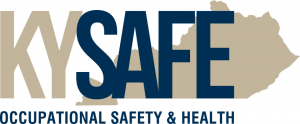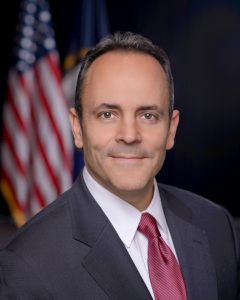
Photo: Kentucky Labor Department
Last month, the Labor Cabinet conducted 27 free on-site visits, or “consultative surveys” for employers, identifying 128 serious violations affecting up to 729 employees, and saving participating companies potential enforcement penalties up to $896,000.
The Labor Cabinet’s Division of Occupational Safety & Health Education & Training leads the Cabinet’s proactive efforts to create safe and healthful workplace conditions. This includes providing free consultative surveys to employers in an effort to increase workplace safety by improving injury and illness rates.
Employers and employees all across Kentucky and the nation also have access to cost-free safety and health eLearning programs on the Labor Cabinet’s eTrain website. The Division also offers cost-free OSHA training courses, or “Population Center Training” throughout the state. Proactive approaches to workplace safety, like the ones developed by the Cabinet’s education and training team, are proven methods that reduce workplace injuries and can help employers from paying increased workers’ compensation premiums.
In addition to consultative surveys and OSHA training, cost-free assistance from the Division consists of publications, required workplace posters and information on injury/illness recordkeeping requirements. The Division is also responsible for overseeing the Partnership Programs as well as conducting the Annual Survey of Occupational Injuries and Illnesses, the Census of Fatal Occupational Injuries and the OSHA Data Collection.
According to a recent report from the U.S. Bureau of Labor Statistics (BLS), Kentucky employers recorded the lowest incident rate for nonfatal occupational injuries and illnesses in the state’s history last year.
Along with the Kentucky Safety and Health Network, the Division of Education and Training also co-hosts the Governor’s Safety and Health Conference and Exposition each year. The 33rd annual conference will take place at the Northern Kentucky Convention Center in Covington from May 8-12, 2017. For more info and to register for the conference, please visit kshn.net.
Additional information is available at http://labor.kentucky.gov.

Photo: Louisville Metro Government
Bridges of Hope Neighborhood Place will host its Second Quarterly Community Resource Fair for the Park Hill neighborhood this Saturday, April 8. Themed “Sowing the Seeds of Peace”, the event will be held at the Park Hill Community Center, 1703 South 13th St. from 12 – 4 p.m.
Focusing on residents who live in or near the Park Hill neighborhood — an area just west of Old Louisville which has experienced a disproportionate number of violent deaths – this event is open to all members of the public. More than 30 public, private and non-profit agencies will gather to meet with residents and share information about programs and services.
A giant Easter Egg Hunt will take place at the Park Hill Park directly behind the community center at 3 p.m. for children ages 2-10, sponsored by the Louisville Metro Community Policing Unit. DJ Samosa will spin tunes throughout the day and there will be several prize giveaways including an Easter basket valued at $50.00 and a Microsoft Application online training course valued at $295.00.
The Smile Academy of Kentucky, a mobile dental unit, will provide cleanings, fluoride treatments, and sealants for children 2-18 years of age during the event.
Resources and information will be provided in the following areas:
- Employment opportunities and career preparation
- Educational programs
- Housing
- Legal Issues
- Family services
- Mental and physical health
- Public safety
- Activities and employment for youth
- Community building
“We’re excited to host this great day of community building to once again bring together much needed resources and to support families in breaking the cycle of violence”, stated Nannette Dix, Administrator of Bridges of Hope Neighborhood Place, located in the Park Hill neighborhood.”
The following groups plan to participate: Louisville Metro Government (including Community Services, Parks and Recreation, the Mayor’s SummerWorks Program, the Office for Safe and Healthy Neighborhoods and Community Policing Unit), REimage, Louisville Urban League, Exploited Children’s Help Organization (ECHO), KentuckianaWorks, Family Scholar House, Louisville Metro Housing Authority, Louisville Metro Healthy Start, Smile Academy of Kentucky and many others.
For more information about the Park Hill Community Resource Fair, contact Nannette Dix at 502-634-6057 or Nannett.Dix@louisvilleky.gov.
Kentucky’s seasonally adjusted preliminary unemployment rate for February 2017 was down 0.1 percent from the January 2017 rate of 5.0 percent, according to the Office of Employment and Training (OET), an agency of the Kentucky Education and Workforce Development Cabinet.
The preliminary February 2017 jobless rate was 0.3 percentage points lower than the 5.2 percent rate recorded for the state in February 2016.
The U.S. seasonally adjusted jobless rate for February 2017 was 4.7 percent, according to the U.S. Department of Labor.
Labor force statistics, including the unemployment rate, are based on estimates from the Current Population Survey of households. It is designed to measure trends rather than to count the actual number of people working. It includes jobs in agriculture and those classified as self-employed.
In February 2017, Kentucky’s civilian labor force was 2,044,119 an increase of 18,982 individuals compared to the previous month. Employment was up by 19,092 and the number of unemployed decreased by 110.
“In February, our labor force increased by 0.9 percent,” said Kentucky Labor Market Information Director Kate Shirley Akers, Ph.D. “And over the last year, Kentucky’s employment has increased by 3.3 percent.”
In a separate federal survey of business establishments that excludes jobs in agriculture and people who are self-employed, Kentucky’s seasonally adjusted nonfarm employment increased by 1,900 jobs in February 2017 compared to January 2017.
“Overall, nonfarm employment has increased by 26,400 positions, or 1.4 percent from one year ago,” said Akers. “The largest month-to-month gain in jobs was in the construction sector.”
Nonfarm data is provided by the Bureau of Labor Statistics’ Current Employment Statistics program. According to this survey, five of Kentucky’s 11 major nonfarm North American Industry Classification System (NAICS) job sectors registered gains in employment, while six declined from the previous month.
The construction sector saw the largest month-to-month increase in February 2017, growing by 2,800 positions, or 3.5 percent, from a month ago. Since February 2016, this industry has added 4,700 jobs, growing by 6.1 percent.
Kentucky’s professional and business services also registered gains, increasing by 2,700 positions from January 2017. This sector has added 5,700 jobs, growing 2.6 percent, from February one year ago. This category includes establishments engaged in services that support the day-to-day activities of other organizations, including temporary employment services and payroll processing.
“The month to month gains in professional and business services was driven by growth in administrative and support and waste management and remediation services, which added 1,600 jobs, as well as increases in professional, scientific and technical services, which gained 1,000 positions,” said Akers.
Employment in the educational and health services increased by 800 jobs in February and has gained 4,100 positions over the year. This year to year increase was driven by job gains in health care and social assistance. Health care and social assistance jobs, which account for 12 percent of all nonfarm employment in Kentucky, increased by 1.7 percent from February 2016 to February 2017.
Employment in the other services sector, which includes repairs and maintenance, personal care services, and religious organizations, increased by 400 positions in February 2017 compared to a month ago. Over the year, the sector has added 1,000 positions, growing 1.5 percent.
The mining and logging sector added 100 jobs in February 2017 from a month ago. The industry has declined by 1,700 positions from a year ago.
Employment in the information sector declined by 100 positions in February 2017, but gained 1,100 from February one year ago. The industries in this sector include traditional publishing as well as software publishing; motion pictures and broadcasting; and telecommunications.
The leisure and hospitality sector lost 300 positions in February 2017 from a month ago. Since February 2016, the sector has added 700 jobs. This sector includes arts, entertainment, recreation, accommodation, and food services.
Kentucky’s manufacturing sector declined, decreasing by 500 positions from January 2017 to February 2017. Since February 2016, this sector has grown by 2.5 percent, expanding by 6,200 jobs.
The financial activities sector lost jobs in February 2017, declining by 500 positions from January 2017. This category includes establishments engaged in finance and insurance as well as real estate, rental and leasing. Since February 2016, however, the sector added 1,500 jobs, an increase of 1.6 percent.
Kentucky’s trade, transportation, and utilities also registered losses, decreasing by 1,200 positions over the month. However, since February 2016 the sector has added 5,700 positions, growing by 1.4 percent. This is the largest sector in Kentucky with over 400,000 jobs accounting for one-fifth of all nonfarm employment.
The government sector, which includes public education, public administration agencies and state-owned hospitals, decreased by 2,300 jobs in February 2017. The sector has lost 2,600 positions since last February.
Civilian labor force statistics include nonmilitary workers and unemployed Kentuckians who are actively seeking work. They do not include unemployed Kentuckians who have not looked for employment within the past four weeks.
Kentucky’s statewide unemployment rate and employment levels are seasonally adjusted. Employment statistics undergo sharp fluctuations due to seasonal events, such as weather changes, harvests, holidays and school openings and closings. Seasonal adjustments eliminate these influences and make it easier to observe statistical trends. However, because of the small sample size, county unemployment rates are not seasonally adjusted.
Learn more about the Office of Employment and Training at http://www.kylmi.ky.gov/

Credit: Louisville Metro Police
Mayor Greg Fischer appointed former U.S. Attorney Kerry B. Harvey to conduct a wide-ranging special investigation into allegations surrounding the LMPD Explorer program.
The Mayor also ordered a separate extensive inquiry into all city programs that involve children and teenagers. This inquiry will determine if adequate steps are in place to protect youth and will review and recommend national best practices and policies.
Mayor Fischer has also asked the FBI’s Louisville Office to investigate potential violations of federal law related to sexual abuse allegations in the LMPD Explorer program.
“We have to get to the bottom of these disturbing allegations — for ourselves, for our citizens, for the thousands of LMPD officers who are honest, compassionate, courageous people of integrity,” Mayor Fischer said. “We need to know the truth. And, most importantly, for the victims of anyone who may have committed a crime while wearing an LMPD uniform.
“We have to get the whole story — and we will.”
Special investigator appointed
Until this year, Harvey served as the U.S. Attorney for the Eastern District of Kentucky, a position from which he oversaw the high-profile investigations of former state Personnel Cabinet Secretary Tim Longmeyer and state Agriculture Commissioner Richie Farmer.
Louisville Metro Government today contracted Harvey to examine the allegations of sexual abuse in the LMPD Explorer program, and also actions of city employees and others regarding the alleged abuse.
Mayor Fischer’s office began discussion with Harvey on Tuesday and signed a contract today. Harvey will also periodically update the Metro Council Government Accountability committee on his work.
“Kerry Harvey has a reputation for conducting dogged investigations and holding public institutions accountable,” Mayor Fischer said. “That’s exactly what I expect he’ll do here — conduct a full, comprehensive investigation that will lead to accountability.”
Harvey is being commissioned to look into LMPD and other city entities — conducting interviews, reviewing documents and other activities — to fully ascertain what happened within and around the Explorer program. His investigation will parallel a criminal investigation of the allegations underway by Louisville Metro Police.
“The allegations surrounding the Explorer program, if true, represent unacceptable conduct involving children, and the citizens of Louisville deserve to know what happened,” said Harvey, who assumed the U.S. Attorney post in 2010 and currently is with the Lexington office of the Dickinson Wright law firm.
Citywide inquiry to ensure safety
A separate inquiry will examine all city departments and agencies that have programs for children and teens — or interactions with youth — to determine if adequate steps are in place to protect youth.
The inquiry will also lead to recommendations of national best practices and policies.
“I believe the vast majority of our programs operate effectively, safely and are following best practices, but I am extremely disturbed about the allegations that have surfaced in the Explorer program,” Fischer said. “My concern is that children are protected – and I want parents and grandparents to know that we are taking the welfare of their children seriously.”
The review will be wide-ranging because many departments offer programs for or interact with youth, from Metro Parks to LMPD to Youth Detention Services. The inquiry will also appraise the policies of agencies that partner with Louisville Metro Government, to ensure that they align with the best practices followed by the city.
The first step will be an inventory of all programs involving youth, which the city’s Human Resources Department will undertake. Then, the city will hire an outside national agency to review the programs.
The Mayor said the inquiry is necessary because Louisville Metro Government offers programs or partners with many local agencies on children and youth programming – and a fresh perspective is important. He will direct that the inquiry is both comprehensive and undertaken swiftly.
Fischer said that “no stone will be left unturned” as the city investigates the allegations that have surfaced in the Explorer program. The Mayor also said that transparency is of utmost importance. That is why he asking the courts to unseal the civil lawsuit while the criminal investigation continues.
According to recent national rankings by CBRE Research, both the Louisville Downtown and Suburban Office markets ranked in the Top 10 markets with the lowest asking rental rates in the nation.
Among the 50 Downtown markets tracked by CBRE Research, the Louisville Downtown Office market ranked third overall in terms of most affordable in the nation, while the Louisville Suburban Office market ranked 6th overall among the 58 suburban markets tracked by CBRE Research.
“This recent ranking by CBRE Research further solidifies Louisville’s competitive cost of doing business,” said Mayor Greg Fischer. “The city is experiencing more than $9 billion in investment right now, paired with our low unemployment rate and increase in average weekly wages, so now is the time to be doing business in Louisville.”
CBRE Research shows Louisville Downtown office markets average a cost of $16.71 per square foot, and the Suburban markets average a cost of $17.96 per square foot.
According to CBRE Research, Louisville markets offer more affordable office space than similar-sized peer-cities in the region. For example, Nashville has a $25.35 per square foot Downtown asking rate; Columbus has a $20.33 per square foot Downtown asking rate, and Cincinnati has an $18.28 per square foot Suburban asking rate. The Louisville Downtown Office market is the second-most affordable in the region after St. Louis, while the Louisville Suburban Office market was third most affordable after Cleveland and Detroit.
To view the latest CBRE Louisville Office MarketView report, visit http://cbreemail.com/rv/ff00a55667197643c90742244745810479290793

Photo from ey.com
Ernst & Young LLP, one of the world’s largest business-services organizations, plans to open a 125-member office for executive assistants and other shared professional functions in downtown Louisville with a $4.35 million investment, Mayor Greg Fischer and Gov. Matt Bevin announced today.
“Today is an exciting day for Louisville as we welcome a major new division from EY. This latest location of executive support functions continues to solidify Louisville’s position as a market leader in the global business services sector,” said the Mayor. “Our future is bright thanks to companies like EY that recognize Louisville as a growing and dynamic city with an educated workforce. We are thrilled to welcome this newest EY location to Louisville and look forward to more opportunities to partner with this global industry leader in the future.”
The office will house members of the firm’s expanding National Executive Assistance Team, which supports EY partners across the country, as well as creative and digital services employees. The firm hasn’t yet signed a lease but intends to locate in Louisville’s Central Business District, hiring its full complement by mid-2018. The firm operates similar centers in Dallas, Cleveland and Tucson.
“We are delighted to welcome EY’s professional service center to Kentucky and we are grateful for their investment,” said Gov. Bevin. “Kentucky is quickly becoming the destination of choice for corporate and shared-service centers, thanks to our skilled professional workforce, high quality of life and low business operating costs. We are confident that EY’s Louisville-based, executive support team will be able to effectively serve their executives across the United States.”
“We were very impressed with the level of talent in Louisville and commend efforts by the city, state and local learning institutions to grow the talent base even more aggressively and in new areas,” said Brent Summers, EY’s Americas enterprise support services leader. “That, along with Louisville’s affordability and quality of life, were important factors in our location decision. We are also excited to be locating our new center in the downtown area. There is so much new development and energy. We think it will be a great environment for our new team.”
The firm traces its roots to the early 1900s with the founding of two accounting firms; Ernst & Ernst in Cleveland, and Arthur Young & Co. in Chicago. Their 1989 merger created Ernst & Young, which then became Ernst & Young LLP.
David Calzi, managing partner of the existing Louisville office of Ernst & Young LLP, said the city will make a great home for the new support center.
“The firm has been a proud citizen of Louisville and Kentuckiana since we opened our local practice in 1923. We couldn’t be more pleased that our leadership recognized the desirable facets of our community, and decided to expand our presence here when it had so many other cities to choose from,” Calzi said.
The firm is a member firm of the global EY organization whose members provide assurance, tax, transaction and advisory services to many of the world’s largest companies. They operate in 152 countries, including 30 countries in the Americas, and employ 231,000 people globally.
“EY is just the kind of company our region is working to attract, and we’re excited to have them choose Louisville. They are making a significant investment in our community and creating quality jobs, and they have a reputation for being good corporate citizens. It is our honor to welcome this new division of EY to Greater Louisville,” Deana Epperly Karem, Greater Louisville Inc.’s VP for Regional Growth, said.
To encourage the investment and job growth in the community, the Kentucky Economic Development Finance Authority in February preliminarily approved the company for tax incentives up to $1 million through the Kentucky Business Investment program. The performance-based incentive allows a company to keep a portion of its investment over the agreement term through corporate income tax credits and wage assessments by meeting job and investment targets.
For more information on EY, visit www.ey.com.
 Last week, joined by legislators and officials from local government, education and business associations, Gov. Matt Bevin ceremonially signed House Bill 3, which repeals the state law requiring payment of a set hourly base (prevailing) wage to workers on public works construction projects.
Last week, joined by legislators and officials from local government, education and business associations, Gov. Matt Bevin ceremonially signed House Bill 3, which repeals the state law requiring payment of a set hourly base (prevailing) wage to workers on public works construction projects.
The prevailing wage is the wage set by government, which contractors and subcontractors must pay workers hired for public works projects (such as roads, buildings and sewers) that cost more than $250,000.
“This is one of those win-wins,” said Gov. Bevin. “We want to be good stewards of the limited resources we have, and this is going to be transformative in terms of just the financial impact alone on the Commonwealth of Kentucky. Studies estimate that, conservatively, it will result in somewhere between $125 and $135 million dollars a year in savings.”
A 2014 study by the Kentucky Legislative Research Commission found that the prevailing wage law inflated labor cost by 24 percent and increased the total project cost by 10 to 16 percent on average.
Experts note that prevailing wage regulations create a financial strain on local governments and school districts. In fact, the Kentucky Department of Education estimates that prevailing wage regulations have cost the Commonwealth at least $100 million since 1996.
“Without artificial, and often inflated, wage rates set by antiquated prevailing wage laws, Kentucky is now positioned to complete necessary construction projects at lower costs,” said Rep. Adam Koenig. “We are committed to spending every single tax payer dollar wisely, and Kentucky cities are already saving money due to the swift passage of the prevailing wage repeal by the House and Senate, and Governor Bevin’s prompt signing.”
“As a sponsor of similar legislation last Session, I applaud the efforts of Governor Bevin and my colleagues in the legislature who helped make this prevailing wage repeal bill become law in 2017,” said Sen. Wil Schroder. “This measure will provide more money for construction in our school districts, ultimately putting taxpayer dollars to better use.”
 Weather
Weather Traffic
Traffic @LouisvilleDispatch
@LouisvilleDispatch @LouisvilleDisp
@LouisvilleDisp Subscribe
Subscribe